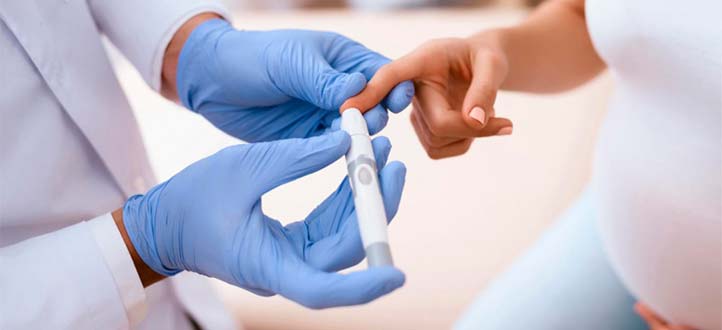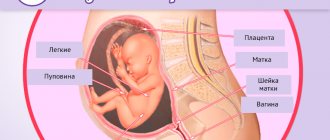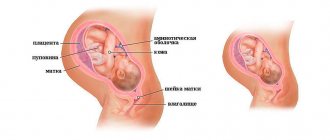What kind of hormone
As soon as conception occurs, the mother’s body begins to actively adapt to bearing a child. And the main role in this process belongs to the hormone hCG - human chorionic gonadotropin. The membrane of the embryo is responsible for its production, so the longer the period, the higher the parameters of the hormone.
And if hCG falls slowly, this indicates disturbances in the development of the fetus. Before the “interesting situation,” the hormone level in both men and women ranges from 0 to 5 mU/ml. The most intensive growth is observed in the early stages of pregnancy - in the first three months.
This is what it looks like:
| Duration of pregnancy, obstetric weeks | HCG value, mIU/ml |
| Not pregnant women | 0-5 |
| The result is questionable | 5-25 |
| 3-4 week | 25-156 |
| 4-5 week | 101-4870 |
| 5-6 week | 1110-31500 |
| 6-7 week | 2560-82300 |
| 7-8 week | 23100-151000 |
| 8-9 week | 27300-233000 |
| 9-13 week | 20900-291000 |
| 13-18 week | 6140-103000 |
| 18-23 week | 4720-80100 |
| 23-41 weeks | 2700-78100 |
As you can see, the parameters vary and depend on the period and condition of the woman. But in any case, the doctor must observe the dynamics of growth. If this does not happen, he should sound the alarm and prescribe a study for the woman.
Placental abruption in early pregnancy. Causes and symptoms
Placental abruption is a well-known concept. And almost everyone knows that there is nothing good in this term. True, most people think that detachment can occur at a later date. It's a delusion. In the early stages, the occurrence of such pathology is also not uncommon.
Causes of placental abruption in early pregnancy
Of course, this is preceded by certain factors that contribute to its development. It is generally accepted that the reasons for the onset of the development of this pathology in the early stages may be:
Age. It is known that the older the woman, the more problems with pregnancy may arise. This is due to the fact that every year the body loses its stability and ability to bear heavy loads, and during pregnancy the load on all organs increases.
Poor nutrition. This means complete non-compliance with the normal diet recommended for pregnant women.
Injury. Often the cause of detachment is an injury that was caused in the abdominal area. This could be a simple hit against the back of a chair, a fall, etc.
Of course, these are only the main reasons that can lead to detachment. This also includes constant stress, which is not uncommon for women in an “interesting position.” It is generally accepted that all diseases are caused by nerves. And here, if a woman is in a state of stress, emotional tension, depression for a long period during pregnancy, then it is quite possible that she may have such a problem.
Knowing the reasons that may contribute to this, every woman can somehow protect herself, lead a healthy lifestyle, or at least try to avoid stress, eat well and be in a great mood.
27 Jun 2020 okberemena
89
When does hCG decrease?
Can hCG fall not only during a frozen pregnancy, but also during other pathologies?
Yes, unfortunately, there are several such cases:
- with an ectopic pregnancy, this usually means the embryo stops in the fallopian tube;
- insufficient blood supply to the placenta;
- If the fetus is pregnant, the hCG level may drop in the last days.
What to do if you find out that hormone parameters are falling? Initially, the cause is determined, then treatment is carried out. Alas, in this case we are no longer talking about saving the child.
It is important to understand that a one-time blood donation cannot determine whether a disorder is present. The point is that you need to track the dynamics of the drop in hCG. There are indicators by which doctors are guided.
| Time limit in weeks | Break from the norm |
| Up to 6 weeks | Less than 2.5 |
| Up to 10 weeks | Less than 3.5 |
| Up to 21 weeks | Less than 3.7 |
| Up to 32 weeks | Less than 2.5 |
How quickly the hCG drops is of great importance. If the parameters have a persistent decrease, this is a warning about the threat of miscarriage. But a sharp reduction - 3 times - indicates that the baby died and nothing can be done in this case.
Sometimes a low result can be one-time; it can be influenced by stress, physical fatigue, and a laboratory test error cannot be ruled out. Answering the question – when does it start to fall, I will say that almost immediately when a problem appears.
Experts say that as a result of studies of a sharp decrease in the hormone, in 27% the child was alive, and in 14% an ectopic was observed. But if you ask the question whether it is possible to revive a frozen pregnancy, I will answer: if the fetus is dead, then nothing can be done.
Can the level increase?
In some situations, against the background of embryo death, the concentration of the hormonal substance continues to increase. In this case, a smooth increase is noted, followed by a stop and decrease. HCG increases during frozen pregnancy for the following reasons:
- Within 24-96 hours after the death of the embryo, the chorion leaves continue to function, because they receive useful substances and oxygen from the mother’s blood and synthesize gonadotropin. But as a result of the death of the embryo, this process slows down. HCG increases 0.2-0.3 times, while with normal development it increases 2 times within 1-2 days. After 4 days, the hormone level decreases.
- Anembryony. Occurs in 15% of cases. Pregnancy failure occurs due to the absence of an embryo in the fertilized egg. The shell of the germ layers is formed after fertilization of the egg, but the development of the fetus itself does not occur. The leaves produce hCG and are immersed in the uterine mucosa, but do not develop. The growth of the hormone is low, the rate of increase is slow and insignificant. A woman feels symptoms of toxicosis, cramps in the lower abdomen. If anembryonia is suspected, an ultrasound is performed.
- Implantation of the fertilized egg outside the uterine cavity. More often it is immersed in the mucous membrane of the ovarian appendages. In such a situation, hCG may increase slightly or remain stable for 3-4 days, and after a week sharply increase by 2 times.
Important information: Table of estradiol norms during early pregnancy
If hCG increases slightly, you need to have your blood tested several times. Monitoring dynamics allows you to timely detect fetal freezing and clean the uterus.
Why doesn't the fetus develop?
On forums, women often share their bitter experiences, noting the reasons that led to the development of a frozen pregnancy.
All of them are formed into the following groups:
- genetics, a chromosomal malfunction leads to the fact that a woman develops a membrane in which the fetus is absent;
- Rh conflict, which is especially pronounced in the second and subsequent pregnancies;
- the presence of infections in the body;
- endocrine disorders;
- bad habits.

Now that you know why the hormone level drops, you need to note that the speed of this process is conditional. For example, after cleaning, within a few days the hormone parameters return to normal. Why does this situation occur, how long does it take for the hormone level to drop, what are the consequences of this condition for a woman?
You can get answers to all these questions in the book “Frozen Pregnancy”, the author Olga Yuryevna Pankova, a famous women’s doctor, reveals the problem in detail.
The main thing is that in the book you can find recommendations that will help you avoid pathology. The publication is interesting both to those women who are just preparing to become mothers, and those who already have experience of motherhood.
How quickly does hCG drop during a frozen pregnancy and what to do?

Glad to welcome you again!
In one of our discussions we already mentioned what hCG is, but many readers still have a question: how quickly does hCG fall during a frozen pregnancy?
Today we will figure out what is happening with this hormone and whether its parameter should fall. This is necessary not only for those who are already expecting a child, but especially for women who decide to become mothers this year!
How to understand that there is a problem
It is almost impossible to talk about the signs of a frozen pregnancy in the first weeks. The woman does not yet feel the baby moving, and there is no fetal heartbeat yet.
And yet, by indirect sensations, you can guess about the pathology:
- toxicosis suddenly disappears;
- the lower abdomen feels tight, the lower back begins to hurt;
- the breast becomes soft;
- brown discharge appears;
- the temperature rises.
If there is a suspicion of a violation, the doctor will prescribe a test. And not once, but twice - with an interval of 3 days. If the pregnancy is frozen, then you need to compare what the hCG was with what happened in the last test. To confirm the diagnosis, the doctor also prescribes an ultrasound examination. You need to take tests in one laboratory, so the result will be more correct.

There are certain rules. For example, you should not eat food 5 hours before the test. There are situations when, with good hCG, progesterone drops. There may be several reasons for this, for example, underdevelopment of the placenta. In any case, the doctor must determine the cause and understand how to eliminate it.
HCG drops
Girls, hello! I am writing at the request of my sister. Since October last year she had 2 pregnancies, but both times she had a gestation at 6 weeks. Now she's taking it again. according to her calculations, weeks 4. The doctor saw something in the uterus, her breasts hurt terribly. I tested hCG, it was more than 100. After 2 days it dropped to 92. The doctor said it was okay. interrupted and you have to wait. until the fetus itself is aborted. BUT! My sister’s breasts were still painful (last times all the symptoms stopped immediately), there were no periods, an ectopic was ruled out. Maybe take it. everything is just like that. Who can tell?
Girls, hello! I am writing at the request of my sister. Since October last year she had 2 pregnancies, but both times she had a gestation at 6 weeks. Now she's taking it again. according to her calculations, weeks 4. The doctor saw something in the uterus, her breasts hurt terribly. I tested hCG, it was more than 100. After 2 days it dropped to 92. The doctor said it was okay. interrupted and you have to wait. until the fetus itself is aborted. BUT! My sister’s breasts were still painful (last times all the symptoms stopped immediately), there were no periods, an ectopic was ruled out. Maybe take it. everything is just like that. Who can tell?
With hCG even more than 100, it is impossible to see anything on an ultrasound. HCG d.b. at least 1000. How was an ectopic excluded? Did you get tested in the same place?
firstly, retake the hCG test again to begin with.
I agree with the anonymous author, it’s unlikely that at this time the doctor would have seen it by ultrasound.
If the hCG decreases further, the pregnancy is terminated.
My sister needs to be examined and find out what is the cause of ST, let her take hormones, she needs to check her androgens. STB at the same time is not an accident. through thorns to our star
After her doctor, she still went to the hospital in the evening, her stomach began to pull. There they again took a test and looked at the ultrasound. It feels good. But the hCG fell, and the doctor said that if it fell, it would not rise again. This means an abortion is underway. But there are no signs. Months no, there is no spotting, my breasts hurt terribly. The first 2 times everything was different.
She was already everywhere, even with geneticists and her husband. I took courses of medication. They discovered only a tendency towards thrombosis, but she began injecting an antithrombosis. injections.
Alas. but the chest. toxicosis, etc. not an indicator. Either you have the wrong information, or the doctor is incompetent. As has already been said, with an hCG of more than 100, it is unrealistic to see anything in the uterus. With an hCG of about 1000, this is also possible. if the pregnancy is singleton.
If hCG begins to fall. I have two possible options - a laboratory error (rarely, but it happens), ST.
What to do? Test hCG over time. Look. If it falls, wait for M. If it grows, monitor and exclude WB or ST in the future.
We are in Germany. We need to see a doctor. Or go to the hospital. In principle, I can imagine an independent laboratory, but where and how much it will cost without a doctor’s referral. I'll have to google it. Thanks. PS: My sister is calm as a boa constrictor. I'm really surprised!
We are in social networks
Self-analysis
On women's forums, mothers often say that they knew about the problem even before they went to the doctor. And they found this out using a standard rapid test. You remember that gonadotropin is present in the urine, which is how pregnancy is determined - there are two stripes, which means you are expecting a baby?
And if the hCG decreases, then instead of two strips you will see one. Women's guess about the presence of a problem is based on this statement. But I hasten to disappoint and warn mothers. The fact is that hCG parameters decrease gradually; it is unknown after how long the hormone drops.
It may happen that time is lost and this will result in serious problems for your health. In addition, it is impossible to monitor how the hormone parameter changes using a regular test. Only special research can do this. And when the uterus is cleaned, after a week the specialist will definitely prescribe a new test.
If after a month the hCG parameters remain high, this indicates the following:
- cleaning was not carried out efficiently;
- remnants of hormonal therapy after IVF.
No matter how difficult your pregnancy problems may be, it is important to always look stylish. And the LUNA mini facial brush will help a woman with this. She is ready to cope with a variety of tasks, for example, removes makeup, cleanses the face of blackheads, and helps improve blood microcirculation.

Reviews from those who have already adopted the compact brush speak for themselves: enthusiastic responses to the silicone bristles of a unique technology.
Can hCG levels decrease and then increase as pregnancy progresses?
For what reason does the hCG level first fall and then rise? The gap between the lower limit of normal and the upper limit is quite large. If the hormone fluctuations are insignificant, then its slight decrease may still be within the normative limits. In this situation, doctors monitor the woman’s condition, suggest she do tests again in a week and prescribe an ultrasound. In addition, a discrepancy between the test results and the norm during a developing pregnancy may indicate that the gestation period is determined incorrectly.
A situation where human chorionic gonadotropin fell at the beginning of pregnancy and then increased again occurs after the IVF procedure. In the first days of gestation, the level of the hormone in the blood is increased due to the hormone therapy protocol, which includes taking hCG.
The production of human chorionic gonadotropin is influenced by other hormones, such as progesterone. If your hCG drops but then rises again, this may be due to fluctuations in progesterone. If the hormone decreases by more than 50% of the norm, therapy with hormonal drugs such as Utrozhestan or Duphaston, which contain synthetic analogues of gestagens, is prescribed. Under the influence of drugs, the concentration of gonadotropic hormone gradually increases.
Low hCG during pregnancy: causes of decrease, consequences
Low levels of the hCG hormone during pregnancy should not always be a cause for concern. Especially when it comes to the 2nd and 3rd trimesters. But its lack in the first 3 months of pregnancy can signal serious complications of the gestational period.
To accurately determine the reasons why such an anomaly may occur, it is necessary to know when hCG decreases during pregnancy under the influence of physiological and when under the influence of pathological factors.
When does the hCG level decrease?
When does hCG decrease in the absence of pathological abnormalities?
Normally, the concentration of the hormone begins to increase from the first day of conception. HCG is produced by the chorion, the membrane of the embryo that protects it from the effects of negative factors. The growth of hormonal element indicators occurs daily, and every day they double, triple, and then ten or more times.
From what week does hCG normally decrease? A gradual decline in the level of this element begins from the 12th week of pregnancy. This is an absolutely normal physiological process that should not alarm either the woman herself or the gynecologist leading the pregnancy.
The decrease in hormone levels occurs as gradually as its increase. Therefore, if you, as a responsible expectant mother, are interested in the question at what period hCG begins to decrease, then this process begins from the 12th week of pregnancy.
But sometimes it happens differently: the gestation period is less than 12 weeks, and the concentration of the hormone, after a short and slight increase, began to rapidly decrease.
In this case, we can talk about pathological reasons for this deviation. If hCG has decreased to critical levels, the patient needs immediate medical intervention.
Otherwise, it will either be impossible to maintain the pregnancy, or the child will be born with serious developmental defects.
Lack of hCG during gestation: what is caused and what could be the consequences?
Why might there be low hCG levels during pregnancy? In the first trimester, such a deviation is often considered pathological, and requires mandatory identification of the causes and their elimination. But the expectant mother should not panic right away: if the disorder was detected in a timely manner, it can be cured.
So, what could cause a decrease in hCG levels during pregnancy? Let's consider the most likely factors.
- Risk of miscarriage. Very low hCG in this case is often caused by hormonal disorders that have occurred in the body of the expectant mother. Under such circumstances, there is only one way out - the patient must be immediately hospitalized and emergency treatment must be started to maintain the pregnancy.
- Ectopic pregnancy (EPP). If the hCG is low and the test is positive, this is often due to an ectopic pregnancy. In this situation, the lack of hormone protein is caused by the fact that the embryo is not in the cavity of the reproductive organ, but outside it (more often in the fallopian tube). This condition is extremely dangerous and therefore requires urgent surgical intervention.
- Using ovulation triggers. A decrease in hCG due to the introduction of triggers is not dangerous. The test for this hormone has its own specifics, therefore, after the procedure for administering hCG, you must wait 14 days, after which you only donate blood.
- Freezing of the fetus. A pathologically low hCG during pregnancy in the second trimester may indicate fetal fading. The situation can be corrected if the deviation is identified in the shortest possible time. But, let’s be honest, doctors have too little time for this, and besides, it is not always possible to save the life of an unborn child.
- Postterm pregnancy causes low hCG at 9 months. In such a situation, obstetricians and gynecologists usually resort to artificial stimulation of labor.
- If progesterone is high and hCG is low, this may signal serious abnormalities in the development of the unborn child. Also, such an imbalance of hormones is observed against the background of placental pathologies, so it should not be ignored.
Placental insufficiency, delayed intrauterine development of the fetus, gestational regression, fraught with the death or complete death of the unborn child - all these dangerous deviations can explain the low level of hCG during pregnancy.
HCG after IVF
Many women are interested in whether the results of hCG testing after IVF differ from those during a natural pregnancy.
No, because with artificial insemination, as with natural conception, there is an increase in the levels of this hormone.
What does a high hCG rate mean and is it dangerous? Read the link https://vseproanalizy.ru/povyshennyiy-hgch.html
If after in vitro fertilization the hCG level is below normal, this means that the procedure was unsuccessful. And it also happens that even after such manipulation, the embryo is attached not in the uterus, but in its appendages. This is the same VMB, in which not only a slight secretion of the hormone protein occurs, but also conditions that threaten the woman’s health are created.
Could the result be unreliable?
Reduced hCG during pregnancy is not always a harbinger of a threatened miscarriage, or a sign of the development of genetically determined pathologies in the unborn child.
Sometimes the analysis itself can be performed without following a certain technology, so the data will be unreliable.
In addition, often many young mothers - consciously or unconsciously - violate the rules of preparing for the test, which also, naturally, affects the final results.
What to do when the level of hCG, according to research, begins to decrease ahead of schedule? Do not panic, but go to your gynecologist with a form where the hormone values are written down.
Patients in the first trimester who have such results usually have to have their blood tested again.
And often they get completely different results, indicating that everything is fine with both the fetus and the mother herself.
How to properly prepare for the test, read the link https://vseproanalizy.ru/kak-sdavat-analiz-na-hgch.html
Note. Perhaps the most harmless reason for a low test for hCG levels during pregnancy is an incorrectly set period. This problem can be easily solved by performing an ultrasound and repeat testing for this hormone.
Treatment and prognosis
Low hCG in some cases may require special therapy. Therapeutic tactics are selected only after the causes of the deviation have been identified.
So, if there is a threat of miscarriage, a woman should go to the hospital for “conservation”. Pharmacotherapy in this case is the only way out. Without it, the embryo will simply die.
Alas, if doctors have reason to believe that low hCG levels are associated with chromosomal abnormalities in the fetus, it will be impossible to correct this situation. However, sometimes errors occur, so the analysis can be carried out 2-3 times in a row. In addition, studies on other hormones also play an important role.
If the results of the hCG test remain the same, and pathological abnormalities are noted in other tests, the threat of developing genetic abnormalities will be confirmed. To have an abortion or continue the pregnancy - the choice will remain with the woman herself.
When an intrauterine pregnancy is diagnosed, the patient is immediately hospitalized. There is only one therapeutic tactic in this situation, and it consists of emergency surgical intervention. If the embryo is not removed on time, it can cause serious consequences for the woman, including death.
Is it possible to continue the pregnancy?
Is pregnancy and its successful completion possible with low hCG? Although it is generally accepted that elevated hormone protein is more common, its low levels are also far from uncommon. And so, women have a question: is it possible to bear a child with such a hormonal disorder?
If it is a consequence of reversible (albeit pathological) processes, then yes. Today, there are a large number of medications containing human chorionic gonadotropin.
These include tablets and injections, but they are prescribed only by a doctor and used under his careful supervision. As a rule, a pregnant woman must remain in a hospital setting throughout the entire course of therapy.
HCG is an amazing, and even unique, hormonal element. It is called the “pregnancy hormone,” and for good reason, because it appears in a woman’s blood, as a rule, after conception has occurred.
Testing for this substance in the first trimester of pregnancy is of great importance. With its help, you can promptly notice deviations, if any, and immediately proceed to therapeutic measures to eliminate them.
Therefore, the expectant mother should not refuse to donate blood for hCG testing. Of course, the doctor has no right to force a woman to undergo this manipulation, but if she cares about her unborn baby and wants him to be born healthy, she should not refuse any tests prescribed by the gynecologist. And especially from the hCG test.
Source: https://vseproanalizy.ru/nizkiy-hgch-pri-beremennosti.html
HCG level during ectopic pregnancy
In a woman with an ectopic pregnancy, the fertilized egg attaches not in the inner layer of the uterus, but in any other place. As a rule, this occurs in the fallopian tubes, less often in the ovaries, uterus, and intestines. This is a dangerous condition, since such a pregnancy is usually terminated. This situation is very dangerous, as the woman can die from serious internal bleeding that is difficult to stop.
However, modern doctors can make this diagnosis in time and take all the necessary measures. This is an ultrasound and a blood test for hCG. Since during an ectopic (ectopic) pregnancy there are very difficult conditions for the attachment of the egg, there are certain features of how human chorionic gonadotropin grows and what its level is determined.
Does hCG increase during an ectopic pregnancy? HCG indicators during ectopic pregnancy grow slowly and do not correspond to the indicators indicated in the tables. It is necessary to monitor this indicator, since with its very slow growth, it is important to conduct an ultrasound using a vaginal sensor to detect the fertilized egg in the uterus or outside the uterus. This is possible if the hCG level is from 1000 IU/l. If the embryo is not detected at the specified level of the hormone, it is necessary to perform laparoscopic surgery and search for the fertilized egg.
What are the signs of an ectopic pregnancy?
- Abdominal pain after missed period.
- Feeling of pain during sexual intercourse and vaginal examinations.
- Bloody discharge (sometimes).
- Fainting during the delay period.
If any or more of these signs appear, it is important to see a doctor to determine the cause. To exclude ectopic pregnancy, hCG analysis and ultrasound are performed.











